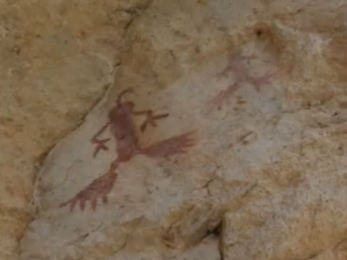Heinrich Abrams was murdered the night Turkoman bandits had come to steal his wife. For months the bandits had stolen livestock and broken into the homes of Mennonites living along the Amu Darya river. Each time, the Mennonites refused to retaliate or even report the thefts to the authorities. The day before Heirich was killed, a group of Turkoman had offered to trade him for his young wife.
That night, as the bandits entered their small adobe house, Elizabeth Abrams, five months pregnant, was able to sneak out and flee to a neighbors house. Shortly afterward, Heinrich’s body was found in their home. He had been stabbed numerous times and shot.
The murder set off a crisis in the Mennonite settlement. Some felt they needed to hire Cossack guards to protect their families. Others felt that hiring others to use weapons would violate their nonviolent ideals as much as if they had committed violence themselves. To them, the highest calling was to love your enemies and pray for those who persecute you. The schism contributed to a further split in the community. Half the group went to America, the other half stayed in Khiva.![rembrandt-the-return-of-the-prodigal-son-the-hermitage-st-petersburg-prodig26[1]](http://pilgrimsonthesilkroad.com/wp-content/uploads/2010/11/rembrandt-the-return-of-the-prodigal-son-the-hermitage-st-petersburg-prodig261-243x300.jpg)
Twelve decades later, Mennonites are still coming to terms with the trek to Central Asia. For generations, many North American families who had ancestors who left Khiva chose not to talk about the episode. Some felt a sense of alienation from the larger Mennonite community. Others felt a sense of fascination with this interesting part of their heritage. Yet, the story was perennially described as a shameful and embarrassing episode brought about by End Times fanaticism, and the delusions of the leader Claas Epp Jr.
Today Mennonites are considering other ways to look at the trek to Central Asia. Recent journeys to Uzbekistan have revealed how the Mennonites of Khiva engaged their Muslim neighbors peacefully, and even helped modernize the Silk Road kingdom.
In the documentary Through the Desert Goes Our Journey, retired Bethel history professor Jim Juhnke explains how a dose of forgiveness is needed to heal the collective memory of the trek:
We need to find ways to find healing – to understand Claas Epp as well as his opponents, and to embrace him, to forgive him, as well as any others who might have been mislead by his teaching. We are all children of God in neeed of God’s grace even when we don’t recognize it.
Forgiveness may have a profound effect on the forgiver. At the University of Maryland, researchers Ryan Fehr and Michele Gelfand studied whether forgiveness could influence creativity. They found that those who choose to forgive are able to think more creatively because it reduces the “cognitive load” otherwise carried by those who choose not to forgive.
Dutch psychologists have constructed a “Tendency to Forgive” scale that measures the swiftness of an individual to forgive a wrong done to them with their cognitive ability. Their research shows that people dwelling on past wrongs perform poorly on tests that check an individual’s ability to organize thoughts and regulate behavior.
Perhaps Don Henley was on to something when he wrote:
I’ve been tryin’ to get down to the Heart of the Matter
But my will gets weak
And my thoughts seem to scatter
But I think it’s about forgiveness…
For Mennonites connected to the trek, Juhnke and other historians are thinking about how forgiving the wrongs of the past can create safe passage for a fuller perspective on the migration.
For everyone, the holidays may be good time to consider forgiveness in the midst of family, friends and even those who we think of as enemies. Scripture and science (and Don Henley) seem to agree that the sooner we forgive, the sooner we think more clearly and creatively about our own lives and our relationships with those around us.


